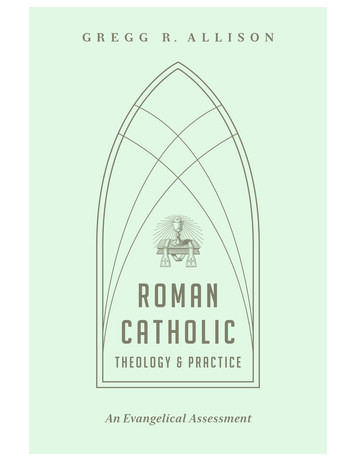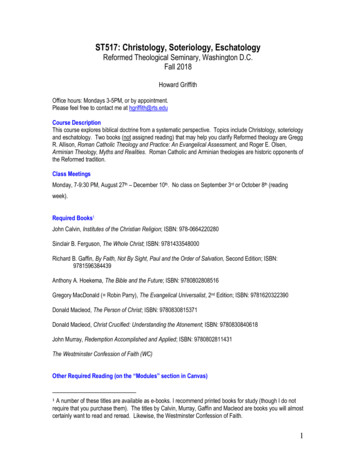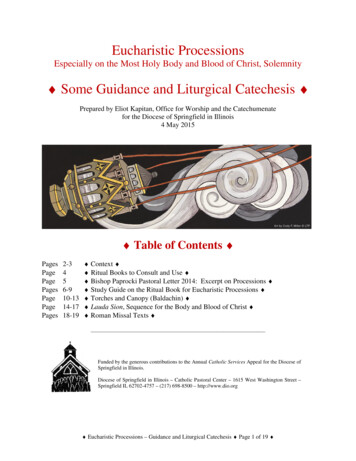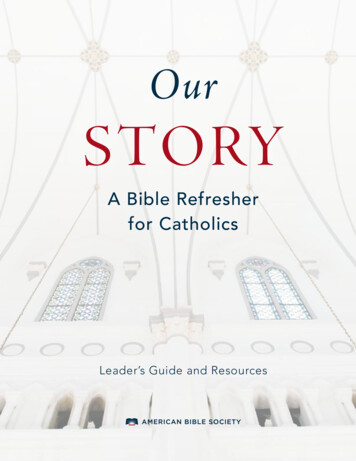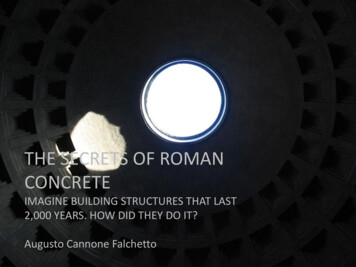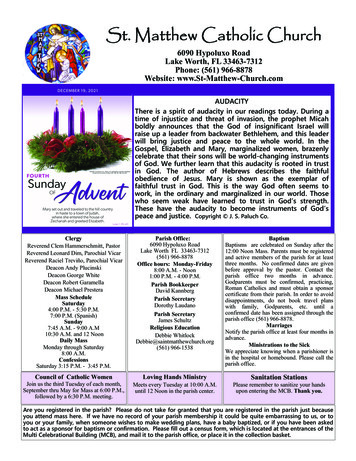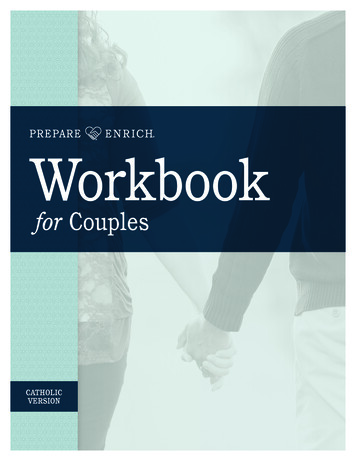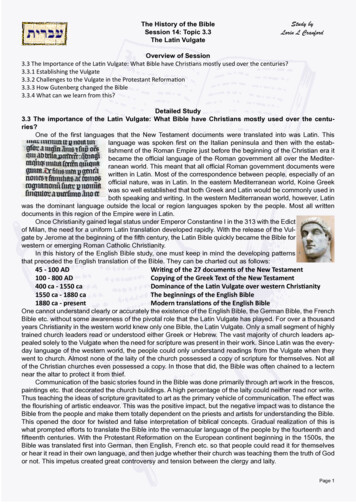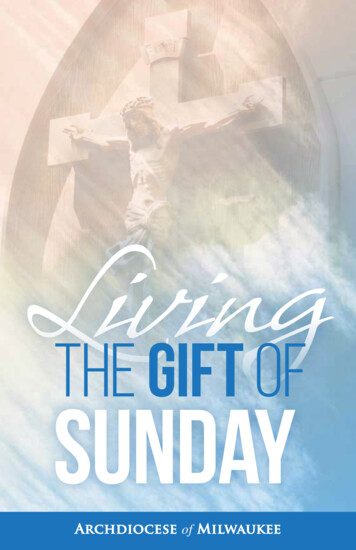
Transcription
LivingThe Gift ofSundayArchdiocese of Milwaukee
LivingThe Gift ofSundayExcerpts from the English translation of The Roman Missal 2010,International Commission on English in the Liturgy Corporation. All rights reserved.Scripture texts in this work are taken from the New American Bible, revised edition 2010, 1991, 1986, 1970 Confraternityof Christian Doctrine, Washington, D.C. and are used by permission of the copyright owner. All Rights Reserved. No partof the New American Bible may be reproduced in any form without permission in writing from the copyright owner.
Table of ContentsIntroduction from Archbishop Jerome Listecki . . . . . . . . . . . . . . .7-9Sunday is a Day of Christ’s Resurrection . . . . . . . . . . . . . . . . . 10-12Sunday is a Day of Peace . . . . . . . . . . . . . . . . . . . . . . . . . . . 13-15Sunday is the Day that Belongs to God . . . . . . . . . . . . . . . . . . 16-18Sunday is a Day of Rest . . . . . . . . . . . . . . . . . . . . . . . . . . . . 19-21Sunday is a Day of Worship . . . . . . . . . . . . . . . . . . . . . . . . . 22-24Sunday is a Day of Loving Sacrifice . . . . . . . . . . . . . . . . . . . . 25-27Sunday is a Day of Family . . . . . . . . . . . . . . . . . . . . . . . . . . 28-29Sunday is a Day of Mission . . . . . . . . . . . . . . . . . . . . . . . . . 30-32Sunday is a Day of Unity . . . . . . . . . . . . . . . . . . . . . . . . . . .33-35Sunday is Our First Day . . . . . . . . . . . . . . . . . . . . . . . . . . . .36-38AcknowledgementsA special thank you to Fr. Brad Krawczyk for his contribution to Living the Gift of Sunday. Fr. Brad was thelead writer on the team that consisted of Archbishop Jerome Listecki, Bishop Jeffrey Haines, Bishop JamesSchuerman, Pete Burds, Lydia LoCoco, Susan McNeil, Randy Nohl, Margaret Rhody, and Jerry Topczewski.We also want to recognize the work of Letzbia Laing-Martinez in translating Living the Gift of Sunday,Caroline Harvey, Meghan Endter, and Gina Rupcic of the Archdiocesan Communication Office for the layoutand design of the booklet, and Kim Mandelkow of the Office for Worship for providing approved liturgicaltexts in Spanish. We are extremely grateful for this group’s dedication and work on this resource!
An Introductionfrom Archbishop Jerome ListeckiDear Brothers and Sisters in Christ,It is my hope that you will utilize this book to enliven your prayer and appreciationfor Sunday over the next ten weeks. Living the Gift of Sunday contains ten weeks ofreflections on how Sunday is a great gift for us, and how we might live that gift outin our everyday lives. It is meant for individual reflection, but could also be usedwith your family or as the basis of a small group discussion.Many of the Prefaces of the Eucharistic Prayer at Mass begin, “It is truly right andjust, our duty and our salvation, always and everywhere to give you thanks, Lord,holy Father, almighty and eternal God through Christ our Lord.” Let us keep thisattitude in mind over these next weeks as we reflect on the meaning of Sunday inour lives as Christians, remembering that Sunday is a gift from God.“The Church draws her life from the Eucharist.” Pope Saint John Paul II wrote thisshort but meaningful phrase in his encyclical letter Ecclesia de Eucharistia (7).The early Christians even at the risk of being misunderstood and in the face ofpersecution and death, faithfully proclaimed “Sine Dominico non possumus – wecannot live without celebrating the Lord’s Day” (Cf. St. Justin Apologia I, 67, 3-5: PG6, 430; Acta SS. Saturnini, Dativi et aliorum plurimorum Martyrum in Africa, 7, 9, 10:PL 8, 707, 709-710).It is my hope that you will utilize this book to enlivenyour prayer and appreciation for Sunday.-6--7-
When we gather for Mass onSunday, as fellow Christians havethrough the millennia, we knowat our deepest level that we arebrought in the newness of lifethat is Jesus Christ himself as wehear Sacred Scripture and arenourished and strengthened by hisBody and Blood.Sundays are different forChristians. In fact, in our modernworld, what defines us as Catholicsis our participation in the praiseof God as a community as we offerto the Father, through the powerof the Holy Spirit, the living sacrifice of Christ on the cross for our salvation,on Sundays.Each Sunday is a participation in the very action of Christ himself, and weencounter the living God alive in our midst. At the very beginning of Mass, wemake the Sign of the Cross. We may take this prayer for granted. We may pray itwith profound devotion. For us, as Christians, it is a reminder that we are caughtup in the love of the Blessed Trinity itself, as we recall the very instrument of oursalvation.Saint Cyril of Jerusalem asserts, “Let us not then be ashamed to confess theCrucified. Be the Cross our seal made with boldness by our fingers on our brow,and on everything” (Catechetical Lectures, Lecture XIII). The Sign of the Cross,-8-as with many liturgical signs, conveys arichness of meanings. Saint Francis deSales notes, “When making the Sign of theCross, therefore, we confess three greatmysteries: the Trinity, the Passion, and theremission of sins” (The Sign of the Cross).Each Sundayis a participationin the very actionof Christ himself,and we encounterthe living Godalive in our midst.As we begin each week in prayer, weare consciously aware of the work of theBlessed Trinity. As we mark the Lord’s Daywith fidelity, we come to church with joysand sorrows. We bring all of this to God andallow God to transform us. It is impossibleto limit what Sunday is and what we religiously bring to our worship of God eachweek. This booklet is a starting point to invigorate our appreciation for whatSunday is and what the Blessed Trinity accomplishes in and through lives filledwith grace.Let us ask through the intercession of Mary Mother of the Church, that as welook to her as a model, we may grow in our love for God through our ferventworship and Christian living.Sincerely yours in Christ, Jerome E. ListeckiArchbishop of Milwaukee-9-
From the Riches of Our FaithOur lives have meaning because Christ rose from the dead. He is alive and present to us inWord, in Sacrament and in His Holy Spirit, who moves and guides us. Sunday is a day to rejoicein new life, eternal life, life in the love of God. We are invited to see every Sunday as a littleEaster.“Jesus rose from the dead ‘on the first day of the week.’ Because it is the ‘first day,’ the dayof Christ’s Resurrection recalls the first creation. Because it is the ‘eighth day’ following thesabbath, it symbolizes the new creation ushered in by Christ’s Resurrection. For Christiansit has become the first of all days, the first of all feasts, the Lord’s Day” (The Catechism ofthe Catholic Church, 2174) [hereinafter, CCC]. “We all gather on the day of the sun, for it is thefirst day [after the Jewish sabbath, but also the first day] when God, separating matter fromdarkness, made the world; and on this same day Jesus Christ our Savior rose from the dead” (St.Justin, I Apol. 67, PG 6, 429 and 432).Sundayisa Day of Christ’s ResurrectionFrom Sacred ScriptureMark 16:2-6Very early when the sun had risen, on the first day of the week, they came to the tomb.They were saying to one another, “Who will roll back the stone for us from the entranceto the tomb?” When they looked up, they saw that the stone had been rolled back; it wasvery large. On entering the tomb they saw a young man sitting on the right side, clothedin a white robe, and they were utterly amazed. He said to them, “Do not be amazed! Youseek Jesus of Nazareth, the crucified. He has been raised ”From the Mass, Source and Summit of LifeWe encounter the risen Christ in the Word of God proclaimed and in the Eucharist we share.During the Eucharistic Prayer, we recall Christ’s dying to save us from sin and death and hisrising to bring us new and eternal life.“Therefore, O Lord, as we celebrate the memorial of the saving Passion of your Son, hiswondrous Resurrection and Ascension into heaven, and as we look forward to his secondcoming, we offer you in thanksgiving this holy and living sacrifice” (Eucharistic Prayer III).- 10 -Christ’s triumph over death in His glorious Resurrection is the completion and fulfillment ofthe Old Law. It is, in Sunday worship, the highest and greatest of days, the principle day ofobligation for the Christian faithful, and the culmination renewed and re-encountered eachweek, of the salvation God has wrought in His Son.St. Luke’s Gospel story of the two disciples and their encounter with the risen Jesus on EasterSunday on the road to Emmaus (24: 13-35) beautifully connects how we come to know our risenLord through Mass every Sunday. As the disciples walked and discussed Sacred Scripturewith him they believed him to be a stranger, but they realized that it was the risen Jesus in thebreaking of the bread. Each Sunday our hearts are stirred by Jesus in the word as he preparesus to receive his Real Presence in the Eucharist.Live It! Celebrate Sunday as a little Easter eachweek by recalling Christ’s resurrectionand look forward to eternal life in Him. What area of your life are you in need ofGod’s new life? Reflect on how God hasbeen present in your life even in difficulttimes. Look for ways to share theseinsights with people you know. Ask your family and friends: What issomething that gives you hope?- 11 -
Sacred Scripture throughout the Week1. Psalm 118:24This is the day the Lord has made.2. Luke 24:1-9Why seek the living one among the dead?3. John 11:25-26I am the resurrection and the life.4. John 20:1-9He saw and believed.5. Acts 4:33The Apostles bore witness to the resurrection.6. 1 Peter 1:3-5Hope through the resurrection of Jesus Christ.Remember, Sunday is a Day of Christ’s Resurrection.Sundayisa Day of PeaceFrom Sacred ScriptureJohn 20:19, 21-23On the evening of that first day of the week, when the doors were locked where the discipleswere for fear of the Jews, Jesus came and stood in their midst and said to them, “Peace be withyou!” [Jesus] said to them again, “Peace be with you. As the Father has sent me, so I send you.”And when he had said this, he breathed on them and said to them, “Receive the holy Spirit.Whose sins you forgive are forgiven them, and whose sins you retain are retained.”From the Mass, Source and Summit of LifeChrist’s atoning sacrifice for our sins on the cross makes reconciliation possible. Peace andharmony are possible. Through the restoration of our relationship with God, we can begin torecognize the other relationships in our lives that are also in need of healing. Reconciliationrequires an admission of our own responsibility for sin before God. At every Mass, we startwith the Penitential Act, acknowledging our sins and announce our trust in God’s mercy.“May almighty God have mercy on us, forgive us our sins, and bring us to everlasting life”(The Roman Missal).- 12 -- 13 -
Live It!At the Rite of Peace, the celebrant praysthat the peace of Christ fills our hearts.As a sign of hope, we extend a sign ofpeace to those around us. “Lord JesusChrist, who said to your Apostles: PeaceI leave you, my peace I give you, looknot on our sins, but on the faith of yourChurch, and graciously grant her peaceand unity in accordance with your will.Who live and reign for ever and ever.Amen. The peace of the Lord be withyou always. And with your spirit”(The Roman Missal). If you need reconciliation with a family member or a member of the wider community, bethe first to hold out an olive branch. Reflect on a person or area of your city, country, theworld that needs peace. Celebrate the Sacrament of Penance (Confession). Consider going together as a family foreach person to receive the Sacrament of Reconciliation. Pray together the Chaplet of Divine Mercy and feel the warmth of God’s forgiving love.Sacred Scripture throughout the WeekFrom the Richesof Our FaithThe Sign of Peace is more thansimply a greeting. It is more a prayerfor reconciliation as a foretaste ofcommunion in the Body of Christ.Among many rich cultural expressions ofSunday, because of its principal placereconciliation, the beloved Polish customas the primary day of worship,of Oplatek, or the Christmas wafer, isa fascinating one. Before the meal isis also a day for laying aside jealousies,served, family members break a pieceanger, and ill-will.of their Christmas wafers to share withthe others in their household, wishingeach other well, asking for forgiveness formisunderstandings, and making peace with one another. There’s even a wafer to be sharedwith the animals of the house! We need signs and symbols that move us to true reconciliationand peace.1. Matthew 5:9Blessed are the peacemakers.2. Matthew 5:23-24Reconcile with others before offering gifts at the altar.3. John 14:27My peace I give to you.4. John 16:33I have conquered the world.5. 2 Thessalonians 3:16May the Lord of peace give you peace.6. 1 John 4:20Love others as you love God.Remember, Sunday is a Day of Peace.“With compassion, Christ declares the sabbath for doing good rather than harm, for saving liferather than killing” (CCC, 2173).Sunday, because of its principal place as the primary day of worship, is also a day for layingaside jealousies, anger, and ill-will. The Lord demands our worship, but that worship may notprecede the forgiveness of the sins and faults of our brothers and sisters. We are called tobring God’s peace, mercy, and love into our world.- 14 -- 15 -
From the Riches of Our FaithAs Christians, we believe that God is at the very center of our lives. Our spiritual journey onearth is one of deepening our relationship with God, and that includes listening intently toHis word. The deepest expression of that listening is hearing the communal proclamation ofSacred Scripture in the Liturgy of the Word. We listen to God speak so that we might internalizeHis message and put it into practice.The Catechism of the Catholic Church starts its reflection on the Third Commandment with thescriptural meaning of the Sabbath. Exodus 20:8-11 states that the Sabbath was the seventhday on which the Lord rested after the work of the previous six days. Deuteronomy 5:12 addsthat the Sabbath is a day of our renewing the covenant with God. The Sabbath is connected tocreation and covenant. Second-century writers such as Justin Martyr attest to the widespreadpractice of Sunday worship (First Apology, chapter 67), and by 361 AD it had become amandated weekly occurrence.Sundayisthe Day that Belongs to GodFrom Sacred ScriptureExodus 20:8-10aRemember the sabbath day—keep it holy. Six days you may labor and do all your work,but the seventh day is a sabbath of the LORD your God.From the Mass, Source and Summit of LifeThe Sacred Scriptures are the word of God, inspired by the Holy Spirit. At Mass during theLiturgy of the Word, God speaks to us through the readings and the Gospel. The ResponsorialPsalm helps us to meditate on God’s word.“You are indeed Holy, O Lord, and all you have created rightly gives you praise, for through yourSon our Lord Jesus Christ, by the power and working of the Holy Spirit, you give life to all thingsand make them holy, and you never cease to gather a people to yourself, so that from the risingof the sun to its setting a pure sacrifice may be offered to your name” (Eucharistic Prayer III).- 16 -“The celebration of Sunday observes the moral commandment inscribed by nature in thehuman heart to render to God an outward, visible, and regular worship ‘as a sign of hisuniversal beneficence to all’ [St. Thomas Aquinas, Summa Theologica II-II, 122,4]. Sundayworship fulfills the moral command of the Old Covenant, taking up its rhythm and spirit in theweekly celebration of the Creator and Redeemer of his people” (CCC, 2176). We are naturallydriven to make Sundays special. Our active participation in the Lord’s Day shows the world thatwe belong to God. Each Sunday, at Mass, God pours out His richest blessings upon us.For Christians, Sunday is the day to come togetherto worship. Early Christians met together onSunday to break bread and for preaching (Acts20:7). Revelation 1:10 also refers to the Lord’s Day.We receive God in the preached Word and throughthe Lord’s Supper. At Mass, the Lord gives us whatwe most need. Sunday makes Monday right. Letus find time to be with Him.As the Catechism of the Catholic Church says, Godmade the Sabbath for man, providing the model ofrest and refreshment it should embody (Cf. CCC,2172, Matthew 2:27-28). Sunday specially belongsto God as it commemorates His saving deeds,from Creation through the Exodus to the greatPaschal Mystery which is recalled each Sunday.- 17 -
Live It! Strive to put God at the center of your day. Arrive to Mass early, review the week and offerto God the good and ask forgiveness for the failures. Offer up the gifts and challenges ofyour past week and upcoming week along with the bread and wine as they are brought tothe altar to be transformed. In the Book of Genesis God uses the Sabbath Rest to ponder the grandeur of Creation.After Mass consider a walk down a hiking trail, a ride down a bike path, a stroll along thelakeshore, or a climb up on the hills and give praise to God for “How Good” it is. Begin and end each day of the week by making the Sign of the Cross prayerfullyrecognizing we are loved by God.Sacred Scripture throughout the Week1. Genesis 1:1-2:3God created the heavens and the earth.2. Psalm 34:9Taste and see that the Lord is good.3. Matthew 12:1-8The Son of Man is Lord of the sabbath.4. Matthew 22:36-40 You shall love the Lord with all your heart, soul, and mind.5. Luke 24:30-35Jesus was made known in the breaking of the bread.6. Acts 20:7Gathering on the first day of the week to break bread.Remember, Sunday is the Day that Belongs to God.- 18 -Sundayisa Day of RestFrom Sacred ScriptureMatthew 11:28-30Come to me, all you who labor and are burdened, and I will give you rest. Take my yokeupon you and learn from me, for I am meek and humble of heart; and you will find rest foryourselves. For my yoke is easy, and my burden light.From the Mass, Source and Summit of LifeNotice the relationship between the moments of sacred silence in the Mass. In the PenitentialAct and after the invitation “Let us pray,” the faithful are called to recollect themselves (GeneralInstruction of the Roman Missal, 45). Before the Liturgy of the Word, after the First and SecondReadings, and after the Homily are opportunities to pause and be silent to prepare to receiveGod’s word and reflect on what was heard (GIRM, 56). Sacred silence during the EucharisticPrayer and the prayer of thanksgiving after Holy Communion help all to praise God in theirhearts (GIRM, 45; 78). These restful pauses help us to slow down, relax and meditate on thepresence of God in our lives and the life of the world, and to experience Sunday as a day of rest.- 19 -
From the Riches of Our FaithThroughout the week, our lives are filled with busyness, social media, and tending to theday-to-day necessities of life. Distractions are constant. We need rest to be able to relax ourbodies, clear our minds and refresh our spirits. Taking time away from work, shopping, and ourdaily routines is essential for our spiritual, mental and physical wellbeing.With the current emphasis upon being busy at home and work and the emphasis upon newforms of electronic communication, busyness is everywhere. There truly needs to be a sacredspace and time which the job cannot penetrate. Consider the words of Saint Augustine, “Greatart Thou, O Lord, and greatly to be praised; great is Thy power, and of Thy wisdom, there is noend Thou movest us to delight in praising Thee; for Thou hast formed us for Thyself, and ourhearts are restless till they find rest in Thee (Confessions).Catholic recommendations to rest on Sunday do not hinder participation in “ordinary andinnocent occupations.” In the spirit of the Sabbath, Catholics ought to observe a day of restfrom servile work, which also becomes “a day of protest against the servitude of work and theworship of money” (CCC, 2172).“Just as God ‘rested on the seventh dayfrom all his work which he had done,’human life has a rhythm of work andrest. The institution of the Lord’s Dayhelps everyone enjoy adequate rest andleisure to cultivate their familial, cultural,social, and religious lives” (CCC, 2184).People are not a slave to work (in all itsmany forms); work is, rather, the servantof humankind, wherein, by cooperationwith God’s grace, we fulfill our obligationto provide for material goods for all.Nonetheless, these goods are not endsin themselves, but tools we employ,as the Catechism says, to cultivate ourlives of faith for the good of ourselves,our families, and our world. We needadequate time to rest from labor to fulfillthese goals, and to render due thanks tothe God from Whom all gifts come.Live It! What is one thing you could make time for on Sunday that you don’t have time for the restof the week? It might be something you do with family or friends or by yourself, i.e. take awalk or bike ride, watch a movie, read. Look for ways to clear your Sunday of unnecessary work and busyness. Rather than fillingthe day with shopping, cleaning and organizing, focus on prayer, family and leisure. Take a break from the iPhone, television, stereo and computer, and let your mind rest inthe silence. “Be Still, and know that I am God!” (Psalm 46:11). Moreover, post a messageregarding your electronic sabbatical to encourage others to do the same. Visit a libraryor bookstore to select a book or audio-book, and set aside quiet time for a journey ofimagination. Parents or older siblings might even take turns reading the story to youngerchildren.Sacred Scripture throughout the Week1.Exodus 33:14The Lord will provide rest.2.Isaiah 14:3-4The Lord offers rest from sorrow and turmoil.3.Mark 2:27The sabbath was made for humanity.4.Mark 6:30-32Come away and rest awhile with Jesus.5.Luke 4:16-19Jesus came to bring glad tiding to the poor.6.Hebrews 4:1-11Sabbath rest remains for the people of God.Remember, Sunday is a Day of Rest.- 20 -- 21 -
In the great praise of God in the Doxology, the celebrant makes the prayer through, with and inChrist, in union with the Holy Spirit, and presents this prayer to God. The people respond withthe Great Amen!, affirming their participation and faith in the sacrifice of praise.Through him, and with him, and in him, O God, almighty Father,in the unity of the Holy Spirit, all glory and honor is yours, for ever and ever. Amen!(The Roman Missal)From the Riches of Our FaithOur society often reinforces within us an egocentric, overly individualistic worldview. It is alltoo easy for us to construct for ourselves a myth of being self-made men and women. Weeasily forget the Gospel truth that all is a gift and all is from God. We need to worship, in allhumility, our Creator, who is all-holy, all-powerful, all-loving, and all-forgiving. He is our source,our sustenance and our goal.Sundayisa Day of WorshipFrom Sacred ScriptureJohn 4:23-24But the hour is coming, and is now here, when true worshipers will worship the Father inSpirit and truth; and indeed, the Father seeks such people to worship him. God is Spirit,and those who worship him must worship in Spirit and truth.From the Mass, Source and Summit of LifeThe Holy, Holy, Holy at Mass captures the idea of the holiness and transcendent nature of God.We are caught up in the vision of God and the worship of God in Heaven that transcends timeand space. We are called to praise, adore, and worship our God who is all-holy.Holy, Holy, Holy Lord God of hosts.Heaven and earth are full of your glory.Hosanna in the highest.Blessed is he who comes in the name of the Lord.- 22 -(The Roman Missal)“Jesus’ gift of himself in the sacrament which is the memorial of his passion tells us that thesuccess of our lives is found in our participation in the trinitarian life offered to us truly anddefinitively in him. The celebration and worship of the Eucharist enable us to draw near to God’slove and to persevere in that love until we are united with the Lord whom we love. The offeringof our lives, our fellowship with the whole community of believers and our solidarity with allmen and women are essential aspects of spiritual worship, holy and pleasing to God (Cf.Romans 12:1), which transforms every aspectof our human existence, to the glory of God”(Sacramentum Caritatis, 94).God demands worship from us, His creatures,whom He made and keeps in existence. Thetype of worship He demands is worship made“in spirit and in truth,” communally offered inthe Church, a renewal and re-presentation ofthe ultimate act of worship, the death of HisSon on the Cross.It has been said that the most perfect ofprayers is also the simplest. Two words.“Thank you!” It is no coincidence that the GreatPrayer of the Church is the same, the meaningof the word “Eucharist” is to “give thanks.”- 23 -
The greatest human activity is to worship God and give thanks for God’s goodness. The worldmay see the worship of God through the Mass as something finite, yet the reality of the sacrificeof Christ allows the faithful to enter the infinite life of love of the Blessed Trinity.Live It! Reflect on how you can order every part of your life to show that God is God and give Himyour entire self. Give God your love, praise, and thanksgiving. As a family, talk about onemain thing that struck each of you from the homily at Sunday Mass. Meditate on the aspects of Sunday worship that are most meaningful to you. Share yourinsights on worship with family and friends. Meditate upon a poem, symphony, opera, painting, sculpture, ballet, or other work of artand let your soul savor the majesty of God in the gift of Beauty.Sacred Scripture throughout the Week1.1 Chronicles 16:23-31Announce the Lord’s salvation.2.Isaiah 6:1-4Holy is the Lord.3.Isaiah 58:13-14Delight in the Lord.4.Psalm 33:1-3Rejoice in the Lord.5.Mark 11:15-19God’s house is a house of prayer.6.Romans 12:1Offer yourself as worship.Remember, Sunday is a Day of Worship.Sunday isa Day of Loving SacrificeFrom Sacred Scripture1 Corinthians 11:23-25For I received from the Lord what I also handed on to you, that the Lord Jesus, on the nighthe was handed over, took bread, and, after he had given thanks, broke it and said, “Thisis my body that is for you. Do this in remembrance of me.” In the same way also the cup,after supper, saying, “This cup is the new covenant in my blood. Do this, as often as youdrink it, in remembrance of me.”From the Mass, Source and Summit of LifeThe Eucharistic prayer at Mass recalls the action of Jesus on the night before his death. Hegave his disciples his Body and Blood in the form of bread and wine. At the anamnesis (or theremembering that makes present), the people recall the saving death and resurrection of theLord. The priest prays that the Holy Spirit comes upon the people, and that in receiving Christ’sBody and Blood (the Real Presence of Christ in the Blessed Sacrament), they may become aliving offering to God.- 24 -- 25 -
“[Christ] is the true and eternal priest, who instituted the pattern of an everlasting sacrificeand was the first to offer himself as the saving Victim, commanding us to make this offering ashis memorial. As we eat his flesh that was sacrificed for us, we are made strong, and as wedrink his blood that was poured out for us, we are washed clean” (Preface I of the Most HolyEucharist).They recognized the sacrificial character of Jesus’ instruction, “Do this in remembrance of me”(Cf. Luke 22:19, 1 Corinthians 11:24–25).From the Riches of Our FaithIn the sacrifice of the Mass, we declare the Paschal Mystery, that is the suffering, death,resurrection, and ascension of Jesus makes all the difference. Through the hands of the priest,Jesus the Lamb of Sacrifice willingly gives of Himself as an atonement for sin and we offer ourown lives of sacrifice with our Blessed Lord to the glory of God the Father.In one sense, becoming a living offering means connecting our own suffering to the sufferingsof Christ. It is an act of faith, trusting that just as the cross was not the end of the story forJesus, it is not the end of the story for us. The love and mercy of God will prevail. On anotherlevel becoming a living offering means dedicating ourselves to lives of service and self-givinglove. Sunday is a day to dedicate our lives to the ways of Jesus, who came not to be served butto serve: “For God so loved the world that he gave his only Son, so that everyone who believesin him might not perish but might have eternal life” (John 3:16).“All that the Son of God did and taught for the reconciliation of the world is not simply knownto us through the historical record of the past; we also experience it through the power of hispresent works It is not only the courageous, glorious martyrs who share in his suffering: all thefaithful who are reborn also share it, and do so in the very act of their rebirth. For when menrenounce Satan and believe in God, when they pass from corruption to new life, when they layaside the image of the earthly man and take on the form of the heavenly man, they go througha kind of death and resurrection. He who is received by Christ and receives Christ is not thesame after baptism as before; the body of thereborn Christian becomes flesh of the CrucifiedChrist” (Pope Saint Leo the Great, Sermon 63, 6).Note that “Sunday . . . is to be observed as theforemost holy day of obligation in the universalChurch” (Code of Canon Law, can. 1246 § 1). Inabstaining from Sunday labors, and in workingto make certain others can rest, as well, alongwith offering to the Father with all the mem
of the Holy Spirit, the living sacrifice of Christ on the cross for our salvation, with grace. on Sundays. Each Sunday is a participation in the very action of Christ himself, and we encounter the living God alive in our midst. At the very beginning of Mass, we make the Sign of the C
